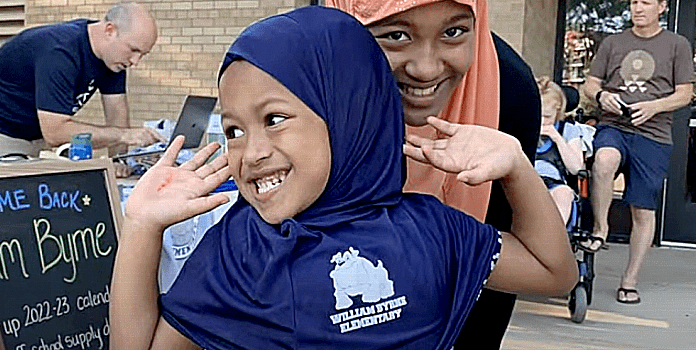(Molly Bruns, Headline USA) An elementary school in Minnesota has started offering “school spirit hijabs” for sale to students, claiming that it is a wonderful sign of diversity.
Byrne Elementary School started offering the hijabs based on advice from the school’s “Somali cultural liaison,” who was brought in to advise on the growing migrant population, National File reported.
The hijab is forcibly worn by Muslim women—sometimes under the penalty of death—in Islamic countries like Somalia.
And now, it is being used as a much promoted tool of diversity at Byrne Elementary.
Even non-Muslim women have donned the hijab, saying that the former symbol of oppression and slavery is now feminist head garb.
A local news broadcast highlighting the school’s program reported that hijabs will be sold for $6, and will be produced in the school’s colors. They will also feature the school’s mascot, Buster the Bulldog.
The headgear will be sold at school events, online and through the school’s Parent Teacher Organization website.
“Every student deserves the opportunity to express their school identity and have that feeling of belonging,” said parent volunteer Carla Valadez.
The school, which is located Burnsville in the Minneapolis metro area, has one of the most dense Somali populations in the country. 15% of Burnsville students speak Somali, not English, at home.
Not more than two decades ago, the district was teaching a supermajority of white American students, now two-thirds of the kids identify as “people of color.”
Somali candidates for the local school board have started to run for office, with the first Somali school board member being appointed and elected in 2021.
The nearby city of Minneapolis has the largest Somali population in the United States, largely due to post-9/11 Muslim migration. The city of Minneapolis is represented by Squad member Ilhan Omar, who posited that the 9/11 attacks were no big deal.
“Some people did something,” Omar said of 9/11, which is known for being the most lethal terrorist attack in American history.

